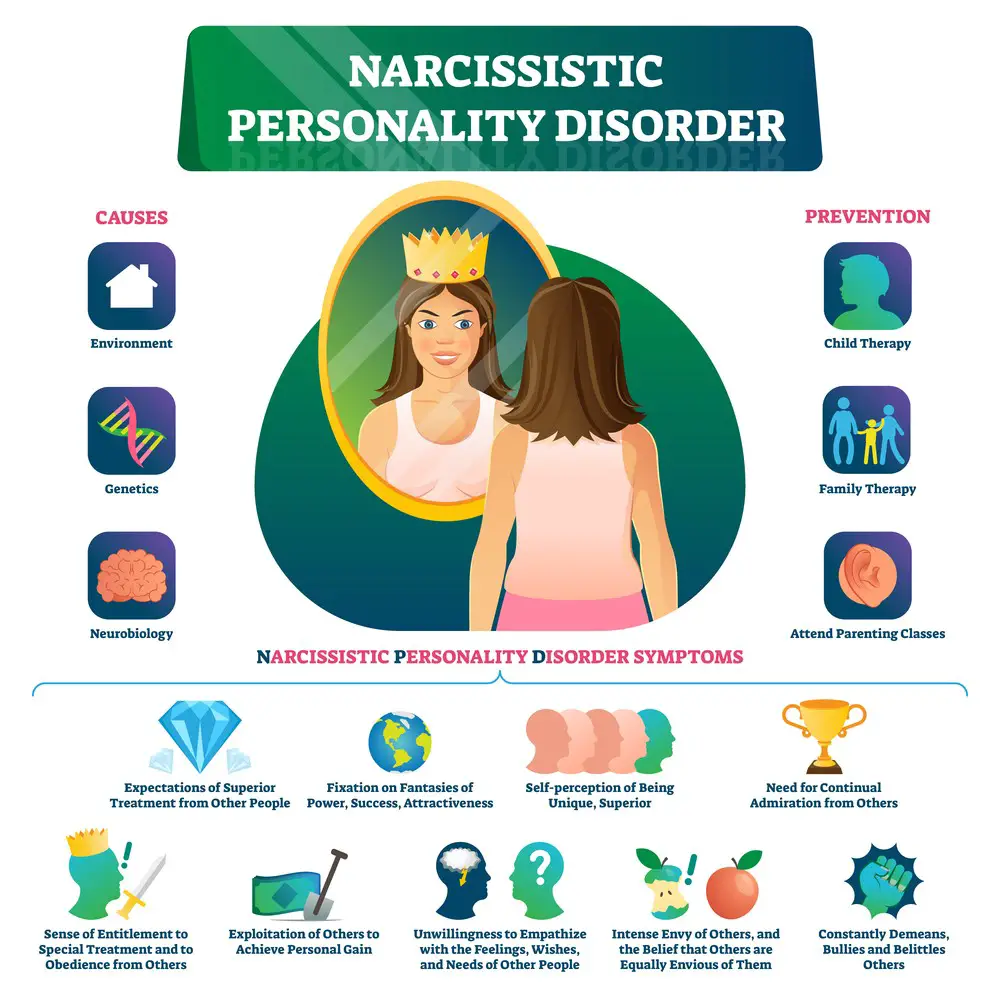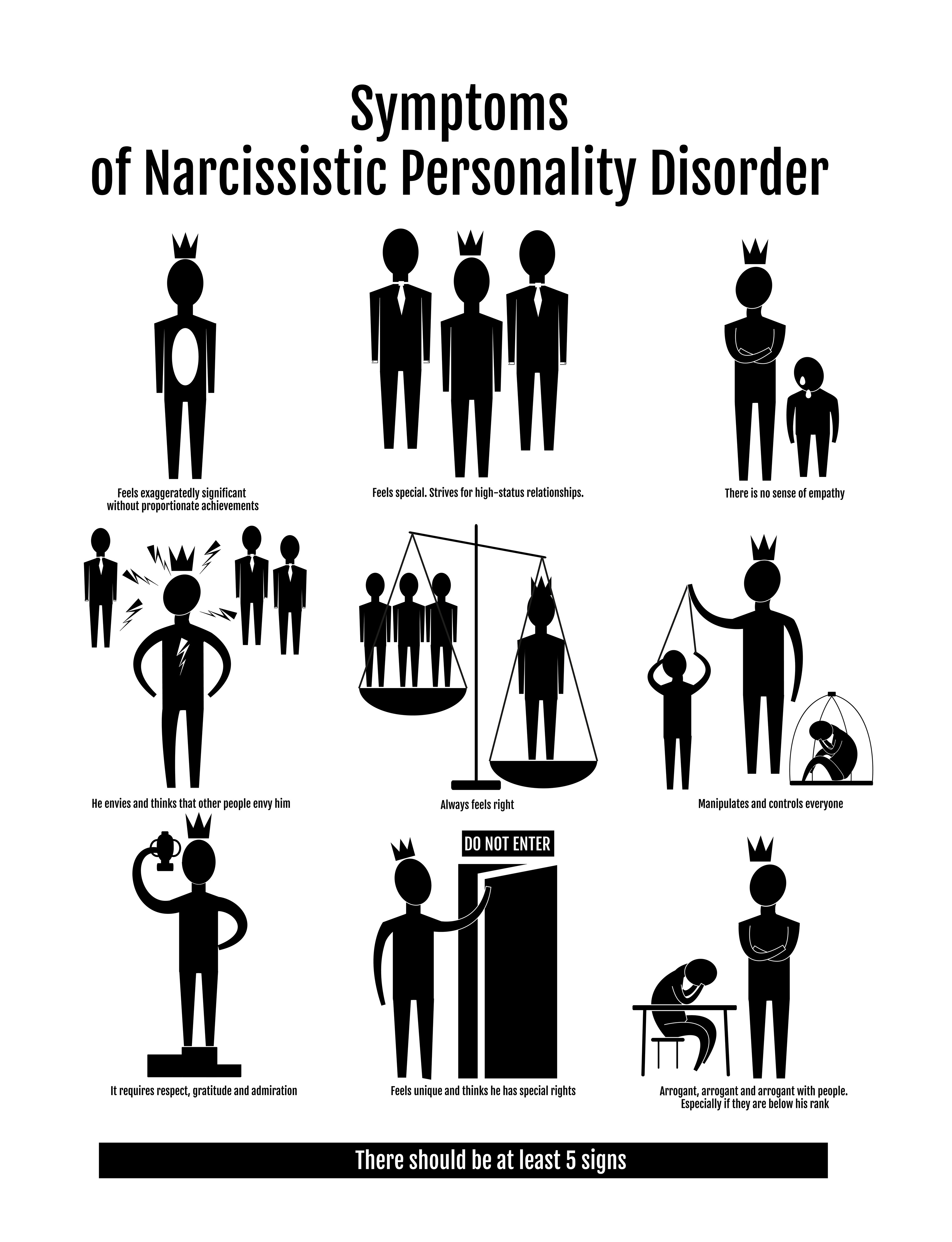As a BetterHelp affiliate, we receive compensation from BetterHelp if you purchase products or services through the links provided
Narcissism is a personality trait characterized by an inflated sense of self-importance, a constant need for admiration, and a lack of empathy for others. It is a complex and often misunderstood concept, with varying degrees of severity. When someone with narcissistic tendencies is confronted with the reality of their narcissism, the reaction can be unpredictable and revealing.
Telling a narcissist that they are, indeed, a narcissist can lead to a range of responses. Some may react with anger and defensiveness, while others may become quiet and introspective. This reaction is often influenced by the individual’s level of self-awareness and their willingness to confront their own shortcomings. In any case, the aftermath of such a confrontation can provide valuable insights into the nature of narcissism and the challenges faced when interacting with individuals who exhibit these traits.
Consistently confronting a narcissist about their behavior can result in various consequences. In some cases, it may lead to realizations and personal growth; however, in other instances, it may result in further manipulation, gaslighting, or withdrawal. Understanding the nuances of narcissism and knowing when to engage is essential in navigating these complex relationships and ultimately supporting both parties’ well-being.
Key Takeaways
- Confronting a narcissist about their narcissism can lead to unpredictable reactions
- The response depends on the individual’s self-awareness and willingness to confront their own shortcomings
- Consistently confronting a narcissist may lead to further manipulation or personal growth, depending on the circumstances

Understanding Narcissism
Personality Disorders Overview
Personality disorders are a group of mental health conditions characterized by unhealthy, inflexible, and maladaptive thinking and behavior patterns. They can interfere with a person’s ability to form and maintain relationships and function in social and work settings. One prominent personality disorder is Narcissistic Personality Disorder (NPD).
Narcissistic Personality Traits
Narcissistic Personality Disorder is defined by the Diagnostic and Statistical Manual (DSM) as a mental health condition involving several traits, some of which include:
- A grandiose sense of self-importance
- Preoccupation with fantasies of unlimited success or power
- A need for excessive admiration
- A sense of entitlement
- Exploitation of others for personal gain
- A lack of empathy
These traits often result in an exaggerated sense of self-worth and a need for attention, making it difficult for individuals with NPD to engage in healthy relationships.
Signs of Narcissism
Recognizing the signs of Narcissistic Personality Disorder can be crucial in understanding the behaviors of a narcissist. Here are some common signs of narcissism:
- Excessive self-focus and self-centeredness
- Frequent exaggeration of achievements and abilities
- Constant craving for admiration and validation
- Unreasonable expectations of special treatment
- Exploitative behavior in relationships
- Inability to handle criticism or rejection
- Jealousy or resentment toward others’ successes
Remember that some people may exhibit a few of these traits without a personality disorder. However, if an individual consistently exhibits several of the signs listed above, they may exhibit Narcissistic Personality Disorder.
 Narcissist’s Behavior
Narcissist’s Behavior
Behaving Like a Narcissist
A narcissist has an inflated sense of self-importance and a deep need for admiration. They often think they deserve special treatment and have little empathy for others. Narcissistic individuals can exhibit various behaviors, such as constantly talking about themselves, dominating conversations, and putting others down to feel superior.
Despite being aware of their narcissistic tendencies, they may struggle to change their behavior because they genuinely believe they are in the right. Maintaining their image and satisfying their need for approval becomes their primary goal, often leading to harmful actions toward others.
Manipulative and Controlling Behavior
Narcissists are notorious for using manipulative and controlling behaviors to maintain power and control over others. Some common tactics they use include:
- Gaslighting: This involves making their victim doubt their reality and perceptions.
- Triangulation: Creating tension and conflict between people to keep them from forming alliances and focusing on the narcissist’s misdeeds.
- Temporary compliance: Pretending to improve their behavior to gain approval, only to revert once they have secured their desired outcome.
These tactics allow narcissists to maintain control, feed their ego, and protect themselves from perceived threats.
Adaptations and Coping Strategies
People who interact with narcissists often develop adaptations and coping strategies to deal with the manipulative behavior. Some effective approaches include:
- Establish boundaries: Clearly define and enforce personal limits that protect oneself from the narcissist’s control.
- Maintain self-awareness: Be aware of the narcissist’s behavior’s impact on oneself and remain grounded in personal values and beliefs.
- Practice self-care: Prioritizing self-care and emotional well-being is essential when dealing with a narcissist.
It’s important to remember that dealing with a narcissist can be draining, and maintaining a healthy distance may sometimes be the best strategy.
Consequences of Confronting a Narcissist
Rage and Resistance
When confronted about their narcissism, a typical reaction for a narcissist might consist of rage and resistance. As their carefully crafted image of themselves is threatened, they become defensive and might lash out. It’s essential to prepare for these reactions when confronting them mentally. Some possible displays of rage and resistance:
- Yelling or shouting
- Belittling or demeaning the person who confronted them
- Refusing to have a rational conversation
- Storming off or disengaging
Narcissistic Injury and Shame
Narcissistic injury refers to the emotional pain experienced by a narcissist when they feel threatened, which can lead to a deep sense of shame. Facing the truth about their behavior, they may try to hide their shame through various means, such as:
- Denying the issue
- Deflecting blame onto someone else
- Becoming withdrawn or silent
- Playing the victim
Understanding this reaction helps anticipate the narcissist’s response and navigate the situation cautiously.
 Gaslighting and More Manipulation
Gaslighting and More Manipulation
Gaslighting is another common tactic deployed by narcissists when confronted about their behavior. They may attempt to manipulate the situation and make the other person doubt their perceptions or thoughts. Some gaslighting techniques include:
- Minimizing the other person’s concerns
- Accusing them of being overly sensitive or misunderstanding
- Denying that certain things happened
- Insisting that the problem lies with the accuser
Recognizing these manipulation strategies and staying firm in your stance can help reduce the impact of the narcissist’s gaslighting attempts.
Understanding the possible reactions when confronting a narcissist makes a person better equipped to handle their responses and maintain their emotional well-being.
 Engaging with Narcissists
Engaging with Narcissists
Setting Boundaries
Establishing boundaries in relationships plays a crucial role when dealing with narcissists. As they tend to focus on their needs and desires, you must stand your ground and assert your feelings. Here are some tips:
- Be specific and clear: Communicate your boundaries to the narcissist. By being explicit, you prevent misunderstandings.
- Stay consistent: Uphold your boundaries, even if the narcissist tries to manipulate or persuade you into changing them.
- Practice self-care: Prioritize your needs and well-being to avoid being controlled or drained by the narcissist.
Communicating Effectively
Effective communication with narcissists can help minimize misunderstandings and conflicts. These strategies can help:
- Avoid criticism and blame: Narcissists are sensitive to criticism and may become defensive. Instead, focus on expressing your needs and feelings.
- Set realistic expectations: Narcissists may not change their behavior, so accepting and adjusting is essential.
- Keep emotions in check: Reacting emotionally can fuel narcissists’ behavior. Stay calm and objective, and maintain a neutral tone of voice.
Seeking Support Systems
Dealing with narcissists can be challenging, making it crucial to have a support system. Lean on friends, family, or professionals who understand your situation and provide guidance. Consider these options:
- Join a support group: Find in-person or online groups that focus on helping individuals who deal with narcissists in their lives.
- Seek therapy: Professional therapists can help you develop coping strategies and work on self-improvement.
- Reach out to friends and family: Connecting with loved ones can provide the emotional support and validation needed when facing a narcissist.
Remember, engaging with narcissists effectively often means maintaining boundaries, adopting effective communication techniques, and having a strong support system.
 Psychological Aspects of Narcissism
Psychological Aspects of Narcissism
Exploring the Narcissistic Ego
The narcissistic ego is a critical facet of a narcissist’s personality. This ego represents an inflated sense of self-worth and self-importance, leading narcissists to believe they are special and superior. This inflated self-image often stems from a fragile sense of self and a desire to be admired by others. When confronted about their narcissistic behavior, their ego will likely become defensive, and they may react aggressively or dismissively.
Low Self-esteem and Insecurity
Ironically, low self-esteem and insecurity often reside beneath the narcissist’s confident exterior. These feelings of inadequacy can make them prone to seeking validation from others, fueling their constant need for attention. Narcissists may engage in attention-seeking behaviors, such as bragging or dominating conversations, to ensure they remain the center of attention. When called out on their narcissistic tendencies, they may become defensive and angry, as this realization threatens their fragile self-concept.
- Validation-seeking: Narcissists may be overly sensitive to criticism, making them more likely to seek validation from others.
- Attention-seeking behaviors: They may dominate conversations, speak in self-aggrandizing terms, or engage in other behaviors.
- Insecurity: When faced with the accusation of being a narcissist, their instinctive response may be to protect their vulnerable self-esteem by becoming defensive, angry, or dismissive.
The Role of Envy and Entitlement
Envy and a sense of entitlement significantly shape a narcissist’s behavior and interactions with others. Narcissists often experience envy towards those they perceive as more successful or attractive, leading them to adopt a disdainful attitude and attempt to elevate themselves. Meanwhile, their sense of entitlement can further drive their egocentric behavior, as they believe they deserve special treatment and can do no wrong.
- Envy: Narcissists may be prone to feelings of envy towards others, causing them to react with disdain or adopt self-elevating strategies.
- Entitlement: A strong sense of entitlement can be associated with narcissism, reinforcing their belief that they deserve special treatment and playing a role in justifying their behaviors.
Recognizing the psychological aspects of narcissism, such as the inflated ego, low self-esteem, insecurity, envy, and entitlement, can help better understand how narcissists may respond to being called out on their behavior. While they may become defensive or dismissive in an attempt to protect their fragile self-concept, this insight can shed light on the complex motivations driving their actions.
 Narcissistic Personality Disorder Treatment
Narcissistic Personality Disorder Treatment
The Role of Therapy
When addressing Narcissistic Personality Disorder (NPD), therapy is crucial in the treatment process. Working with a licensed therapist or a mental health professional can help individuals with NPD understand their condition and develop healthy coping skills. Various approaches like cognitive-behavioral therapy (CBT), psychodynamic therapy, and dialectical behavior therapy (DBT) may be employed. These therapies often focus on:
- Identifying the reasons behind narcissistic behaviors
- Building self-awareness and self-esteem
- Developing empathy and social skills
- Managing negative emotions
Challenges in Treatment
Treating NPD can be a challenging process due to several factors:
- Resistance to change: Individuals with NPD might feel unwilling or unable to accept their condition, denying any need for treatment.
- Difficulty forming a therapeutic alliance: Establishing trust between patient and therapist can be difficult, as individuals with NPD may display defensiveness, hostility, or a lack of vulnerability.
- High dropout rate: Clients may abandon treatment prematurely due to a lack of insight into their issues or discomfort with therapy.
Possible Treatment Outcomes
When people with NPD engage in therapy and commit to change, the outcomes can be positive. Success stories may include:
- Improved self-awareness and emotional regulation
- Better communication and relationship skills
- Increased empathy towards others
- Reduced instances of manipulative behavior
Key Takeaway: Engaging in therapy and addressing the challenges specific to NPD is crucial for individuals seeking treatment and long-term improvement. A professional therapist can help identify the root causes of narcissistic tendencies and support lasting change.
In Depth Look at Related Topics
Narcissism in Workplace Success
Narcissism can play a role in workplace success, both positively and negatively. On one hand, narcissistic individuals tend to exude confidence, which may help them thrive in leadership roles. They are often charismatic and can effectively communicate their ideas and visions.
On the other hand, narcissistic employees may struggle with teamwork and collaboration. They might prioritize their own agendas over the company’s objectives, causing friction with colleagues and supervisors. Additionally, their excessive need for admiration can lead to detrimental relationships in the workplace.
Key takeaway: Narcissism can contribute to both success and challenges in the workplace, depending on the circumstances and the individual’s ability to balance their self-centered tendencies with the demands of their job.
Narcissism in Children
Children can also display narcissistic traits, influencing their social and academic success at school. Some characteristics to watch for include:
- Difficulty handling criticism
- Excessive focus on their achievements
- Lack of empathy for others
These behaviors can affect a child’s relationships with peers and teachers and their ability to learn from their experiences. Parents and educators need to address these traits early on, providing positive reinforcement, clear boundaries, and opportunities for skill-building.
Key takeaway: Recognizing and addressing narcissistic behaviors in children is crucial for fostering healthy social and academic development.
Narcissism and Genetic Vs. Environmental Factors
A complex interplay of genetic and environmental influences influences the development of narcissistic traits. Genetics may contribute to an individual’s predisposition for narcissism, while environmental factors, such as parenting styles and early childhood experiences, play a crucial role in shaping their personality.
Some studies point to a neurobiological basis for narcissism, highlighting brain structure and function differences. For example, researchers have found that narcissists may exhibit reduced gray matter volume in areas associated with empathy and emotional regulation.
Environmental factors, like a child’s upbringing, can also be significant. Overindulgent or overly critical parenting can contribute to narcissistic traits developing in a young individual.
Key takeaway: Narcissistic traits can arise from genetic predispositions, neurobiological factors, and environmental influences, emphasizing the need for early intervention and support for those at risk.
Frequently Asked Questions
How do narcissists react when confronted?
When a narcissist is confronted about their behavior, they typically react negatively. They may become defensive, dismissive, or even aggressive. Their response often attempts to maintain their perceived superiority and control over the situation. Some common reactions include:
- Denial: They may refuse to acknowledge their narcissistic traits.
- Deflection: They may shift the blame onto others or external factors.
- Gaslighting: They may make the confronter doubt their perceptions and feelings.
- Manipulation: They may guilt-trip or emotionally blackmail the confronter to regain control.
Key takeaway: Confronting a narcissist can lead to negative reactions, so approach the situation with caution and self-awareness.
Can you make a narcissist self-aware?
While making a narcissist self-aware can be challenging, it’s not impossible. Empathy, active listening, and gentle questioning can help them recognize their behavior, but progress may be slow. Keep in mind that:
- Patience is crucial as change takes time; don’t expect immediate results.
- Emphasize the benefits of self-awareness, such as better relationships and emotional well-being.
- Avoid being condescending or overly critical, as this may trigger resistance.
Key takeaway: Building self-awareness in a narcissist requires patience, empathy, and gentleness and may lead to gradual change.
What occurs when you challenge a narcissist’s behavior?
Challenging a narcissist’s behavior can cause them to become defensive and reactive. They may:
- Accuse you of being overly sensitive or attacking them.
- Escalate their behavior to assert dominance and regain control.
- Retreat and withdraw, only to resume their behavior after some time.
Key takeaway: Challenging a narcissist’s behavior can lead to defensiveness and further challenges, but remain calm and assertive in your approach.
Is it helpful to tell someone they are with a narcissist?
Informing someone that they’re in a relationship with a narcissist can be beneficial but must be done delicately. Consider the following tips:
- Be compassionate and supportive while discussing your concerns.
- Provide examples of narcissistic behavior to help them understand.
- Encourage them to seek professional help or support from others if needed.
- Validate their feelings and offer a space to discuss their situation.
Key takeaway: Helping someone recognize a narcissistic relationship can be valuable, but ensure you approach the conversation with empathy and support.
How can you tell a narcissist they are wrong?
Telling a narcissist they are wrong requires careful communication to maintain a productive conversation. Some suggestions include:
- Use “I” statements to express your thoughts and feelings without accusing them directly.
- Stick to facts and avoid entering personal attacks or criticisms.
- Remain calm and collected, as getting emotionally charged may encourage further hostility.
- Offer alternative perspectives without demanding they change their view.
Key takeaway: Telling a narcissist they are wrong can be a diplomatic and delicate process, focusing on clear communication and mutual understanding.
What’s the outcome of denying a narcissist’s requests?
Denying a narcissist’s requests can lead to various reactions, as they often struggle to accept rejection or limitations. Some potential outcomes include:
- Anger and frustration possibly lead to aggressive responses.
- Manipulation or guilt-tripping in an attempt to get their way.
- A temporary appearance change in their behavior, followed by a return to their usual patterns.
Key takeaway: Denying a narcissist’s requests may lead to challenging responses, but maintaining firm boundaries is crucial for your well-being.
About Jacob Maslow
After surviving the traumatizing events of 9/11, I took it upon myself to heal through helping others. I’m the primary caregiver of my children and understand from first-hand experience the lonely paths you have to walk as a partner and parent when leaving an unhealthy relationship.
We’re all echoing in a dark space that doesn’t have to be this empty, and that’s been my mission since finding solace and recovery in therapy: To help comfort others who are still in shock and at the prime of their struggle.
I came across BetterHelp after searching for this type of community. I wanted to belong to a body of proactive therapists and supportive therapy veterans that allowed me to see other sides of the story.
It was unconventional, and that’s what attracted me most. During my most challenging times, when my ex-wife completely cut me off from my children, I found comfort and clarity through BetterHelp.
Instead of being chained to a strict therapist recommendation, I was in charge of who I felt understood my struggle most. That allowed me to find my true peace, as I was reunited with those who read behind my words and had first-hand experience with my trauma.
Recovery is a choice; with BetterHelp, that choice will be a few clicks away. You can also join their couples-oriented platform, Regain.us for those stuck with family estrangement and toxic relationship patterns.
- 5 Helpful Ideas for Managing Stress During a Plumbing Emergency - April 24, 2025
- Buying a Franchise Without Losing Your Mind - April 24, 2025
- 3 Ways Wearing a Hat Can Help Lower Your Stress Levels - April 19, 2025
This site contains affiliate links to products. We will receive a commission for purchases made through these links.


 Narcissist’s Behavior
Narcissist’s Behavior Gaslighting and More Manipulation
Gaslighting and More Manipulation Engaging with Narcissists
Engaging with Narcissists Psychological Aspects of Narcissism
Psychological Aspects of Narcissism Narcissistic Personality Disorder Treatment
Narcissistic Personality Disorder Treatment
